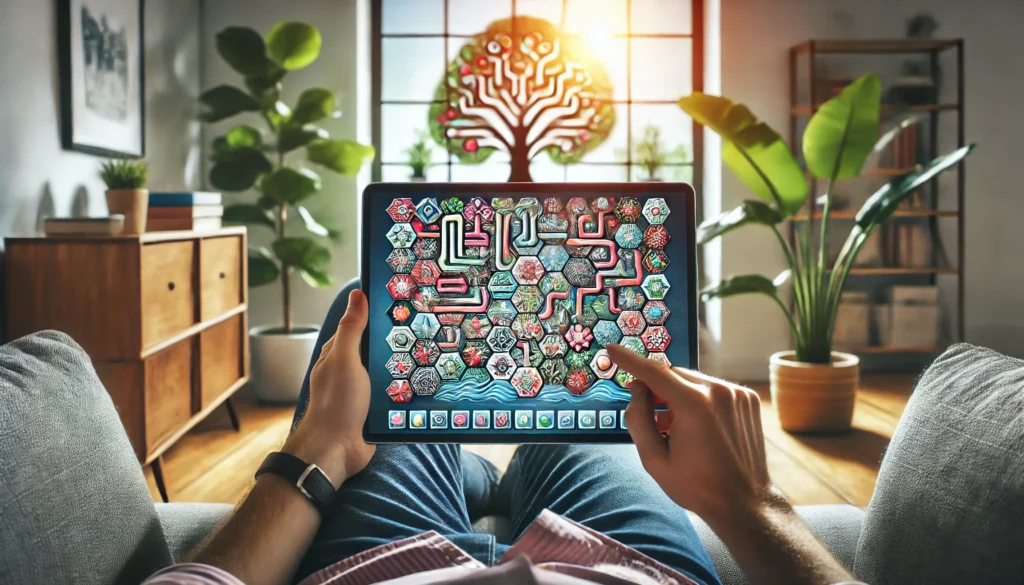Discover the Transformative Power of Mind Games
In the ever-evolving quest for peak cognitive performance, mind games emerge as one of the most accessible and effective tools for sharpening memory and mental agility. These games are more than a pastime; they represent a structured, engaging approach to improving short-term memory, enhancing focus, and fostering mental resilience. Whether you’re a seasoned puzzle enthusiast or new to brain training, discovering the best mind games can help you unlock untapped potential and elevate your mental capabilities.
Mind games are particularly impactful because they tap into neuroplasticity—the brain’s ability to adapt and reorganize itself through experience and learning. By dedicating time to these exercises, you create opportunities to strengthen neural pathways, improve memory recall, and enhance problem-solving skills. This article delves into the science behind memory improvement through gaming, highlighting the most effective mind games to play and strategies for maximizing their benefits. If you’re ready to take your cognitive health to new heights, let’s explore how these brain-training tools can transform your mental landscape.
You may also like: How to Improve Working Memory: Top Short-Term Boosters and Practical Tips
Understanding Short-Term Memory and Its Role in Cognitive Function
Short-term memory, often referred to as working memory, serves as the brain’s temporary storage center. It allows us to hold and manipulate information for brief periods, typically seconds to minutes, enabling us to perform tasks such as mental calculations, problem-solving, and decision-making. Despite its limited capacity, short-term memory is a cornerstone of higher-order cognitive functions.
Neuroscientists have identified that the prefrontal cortex and hippocampus are the primary regions of the brain involved in short-term memory. These areas work in tandem to encode, store, and retrieve information. However, as we age, the efficiency of these processes can decline, making it essential to find effective ways to maintain and enhance memory capabilities. Mind games have emerged as a powerful tool to stimulate these brain regions and foster improved cognitive performance.
The Role of Neuroplasticity in Memory Enhancement
Neuroplasticity, the brain’s ability to adapt and reorganize itself, is central to the effectiveness of mind games. Each time we engage in a challenging cognitive activity, such as solving puzzles or playing memory-intensive games, we strengthen neural connections and promote the formation of new pathways. This adaptability is crucial for overcoming cognitive decline and improving mental agility.
Research demonstrates that consistent engagement in activities that challenge the brain can lead to measurable changes in its structure and function. For example, studies have shown that individuals who regularly participate in the best mind games exhibit increased activity in brain regions associated with memory and problem-solving. These findings underscore the importance of incorporating such activities into daily life to maintain optimal cognitive health.
The Best Mind Games for Boosting Short-Term Memory
Sudoku: A Numbers Game with Cognitive Benefits
Sudoku is a logic-based puzzle that requires players to fill a 9×9 grid with numbers so that each row, column, and 3×3 subgrid contains all digits from 1 to 9. This game is widely regarded as one of the best mind games for enhancing short-term memory due to its reliance on pattern recognition and strategic thinking. Players must hold multiple potential solutions in their minds while eliminating possibilities, a process that strengthens working memory and decision-making skills.
Chess: A Strategic Challenge for the Brain
Chess is a timeless game that demands strategic planning, foresight, and adaptability. Each move requires players to anticipate their opponent’s actions and adjust their strategy accordingly. This high level of cognitive engagement makes chess an excellent mind game to play for boosting memory and concentration. Studies have shown that regular chess players often exhibit superior memory retention and problem-solving abilities compared to non-players.
Memory Match Games: Simple Yet Effective
Memory match games, often referred to as concentration games, involve flipping cards to find matching pairs. While seemingly simple, these games are highly effective at enhancing short-term memory. Players must remember the location of previously revealed cards while searching for matches, a task that directly engages working memory and attention. These games are particularly beneficial for beginners seeking an accessible introduction to memory training.
Dual N-Back: A Scientifically Backed Brain Trainer
The dual n-back game is a scientifically validated cognitive training exercise that challenges players to remember a sequence of visual and auditory stimuli presented simultaneously. As the game progresses, the difficulty increases, requiring players to recall stimuli from multiple steps back. This dynamic gameplay makes dual n-back one of the best mind games for improving both short-term and long-term memory.
Crossword Puzzles: A Language-Based Cognitive Workout
Crossword puzzles are classic brain exercises that combine vocabulary, general knowledge, and problem-solving. Solving crosswords requires players to retrieve information from memory and integrate it with context clues, making them an ideal mind game to play for enhancing memory and language skills. Regular engagement with crossword puzzles has been linked to delayed cognitive decline in older adults.
Strategies for Maximizing the Benefits of Mind Games
Consistency Is Key
To achieve meaningful improvements in memory and cognitive function, consistency is essential. Allocating just 15 to 30 minutes daily to playing mind games can yield significant benefits over time. Establishing a routine ensures that the brain receives regular stimulation, promoting sustained neural growth and adaptability.

Pairing Games with Complementary Activities
Combining mind games with other cognitive-enhancing practices can amplify their effects. Activities such as reading, meditation, and physical exercise complement the benefits of mind games by fostering overall brain health. For instance, aerobic exercise increases blood flow to the brain, enhancing its capacity to process and retain information.
Setting Progressive Challenges
Gradually increasing the difficulty of mind games ensures continuous cognitive engagement. Starting with simpler puzzles or games and progressing to more complex challenges keeps the brain motivated and prevents plateauing. This approach also helps build confidence and encourages long-term participation.
The Broader Implications of Mind Games for Cognitive Health
Stress Reduction and Emotional Resilience
In addition to cognitive benefits, mind games can serve as a form of stress relief. The focused nature of these activities allows players to momentarily disconnect from external stressors and immerse themselves in a mentally stimulating task. This meditative quality not only reduces stress but also fosters emotional resilience and well-being.
Social Connections Through Multiplayer Games
Many mind games, such as chess and online memory match games, offer opportunities for social interaction. Engaging in these activities with friends, family, or online communities fosters camaraderie and shared learning experiences. These social benefits enhance the overall impact of mind games on mental and emotional health.

Unlock Lifelong Cognitive Potential with Mind Games
Mind games represent a unique fusion of entertainment and cognitive enhancement, offering a pathway to sharper memory, better focus, and improved problem-solving skills. By consistently engaging with the best mind games, individuals can fortify their cognitive reserves and build a foundation for lifelong mental agility.
Whether you’re exploring a new mind game to play or honing your skills with a favorite puzzle, the key lies in persistence and enthusiasm. The benefits of these exercises extend far beyond short-term gains, equipping you with the tools to tackle complex challenges and thrive in every aspect of life. Begin your journey toward cognitive mastery today and experience the transformative power of mind games firsthand.
Further Reading
SoM: Boost Your Brain: Working Memory Exercises for Adults
ND: 12 Fun Working Memory Games And Activities For Adults
LH: 25 Memory Exercises That Actually Help You Remember More
MND: 22 brain exercises to improve memory, cognition, and creativity
MMM: How to Improve Working Memory: 8 Exercises That Work
Important Note: The information contained in this article is for general informational purposes only, and should not be construed as health or medical advice, nor is it intended to diagnose, prevent, treat, or cure any disease or health condition. Before embarking on any diet, fitness regimen, or program of nutritional supplementation, it is advisable to consult your healthcare professional in order to determine its safety and probable efficacy in terms of your individual state of health.
Regarding Nutritional Supplements Or Other Non-Prescription Health Products: If any nutritional supplements or other non-prescription health products are mentioned in the foregoing article, any claims or statements made about them have not been evaluated by the U.S. Food and Drug Administration, and such nutritional supplements or other health products are not intended to diagnose, treat, cure, or prevent any disease.


